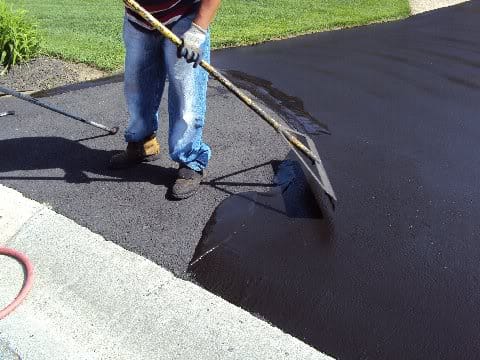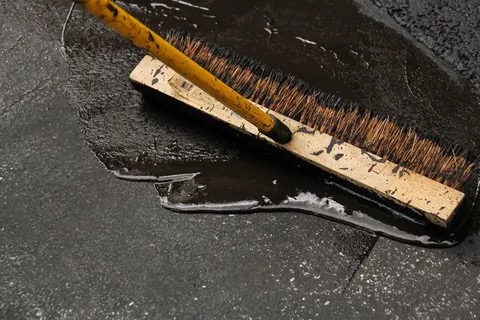Open the Secrets of Asphalt Sealing: Making The Most Of Hot Mix Asphalt Long Life
Open the Secrets of Asphalt Sealing: Making The Most Of Hot Mix Asphalt Long Life
Blog Article
Warm Mix Asphalt: A Lasting Solution for Pavement
Warm Mix Asphalt (HMA) has actually become a leading lasting choice for pavement solutions, offering a myriad of ecological benefits and ingenious modern technologies. Its capacity to reuse materials and decrease energy consumption presents an engaging situation for its adoption in road building jobs. Additionally, the lasting efficiency and longevity of HMA make it a favored option for framework growth. As the demand for environmentally friendly building and construction methods expands, discovering the subtleties of HMA's sustainability can provide useful insights right into the future of pavement remedies.
Ecological Benefits of Hot Mix Asphalt

Moreover, Warm Mix Asphalt aids to minimize urban heat island impacts. Its dark shade takes in sunshine, minimizing the quantity of heat showed back right into the atmosphere contrasted to lighter-colored sidewalks. This can decrease ambient temperatures in city locations, decreasing the demand for air conditioning and inevitably reducing energy consumption.
Furthermore, Hot Mix Asphalt adds to enhanced stormwater administration. Its permeable nature enables water to infiltrate the pavement and charge groundwater supplies, reducing runoff and the risk of flooding. These environmental advantages make Hot Mix Asphalt a lasting option for paving roads and freeways.
Power Effectiveness in HMA Manufacturing
Is power effectiveness a vital aspect in the manufacturing of Hot Mix Asphalt (HMA)? Power plays a considerable duty in the manufacturing of HMA, affecting both expense and environmental sustainability. One crucial aspect of energy effectiveness in HMA production is the use of warm mix asphalt (WMA) innovations.
Moreover, developments in plant technologies have led to more energy-efficient HMA manufacturing processes. By enhancing power use in HMA manufacturing, the industry can decrease its carbon footprint while preserving top quality pavement materials.
Recyclability of Hot Mix Asphalt
The recyclability of Hot Mix Asphalt (HMA) is a critical facet of its sustainability and long-lasting environmental effect. HMA is one of the most recycled materials in the United States, with over 100 million tons of reclaimed asphalt sidewalk (RAP) being reused every year in new pavement building. Recycling HMA uses a number of environmental benefits, such as reducing the requirement for virgin products, decreasing energy intake during manufacturing, and reducing the amount of waste sent to landfills.
The procedure of recycling HMA includes grating the existing sidewalk, crushing it into smaller items, and mixing it with brand-new accumulation and asphalt binder to develop a recycled mix. In general, the recyclability of HMA this article plays a substantial function in promoting sustainable practices within the pavement market.

Long-Term Performance of HMA
Asphalt pavements show durability and durability over an extended period, reflecting the long-term efficiency of Hot Mix Asphalt (HMA) Additionally, innovations in HMA technology, such as the usage of polymer-modified binders and warm mix asphalt, have better improved the longevity and long life of HMA sidewalks. By focusing on quality construction and maintenance techniques, HMA continues to show itself as a lasting and cost-efficient remedy for durable pavement facilities.

HMA: Durability and Sustainability
Showing both longevity and sustainability, Warm Mix Asphalt (HMA) has actually become a cornerstone in the building and construction of long-lasting pavement facilities - angled parking. HMA's longevity originates from its capability to withstand heavy loads, extreme climate condition, and high web traffic quantities, making it a trusted option for highways, highways, and flight terminal paths. The make-up of HMA, which commonly consists of accumulations, binder, and filler, plays a vital duty in enhancing its longevity and resistance to tear and use
Additionally, HMA's sustainability hinges on its recyclability and visit our website energy-efficient manufacturing process. The capacity to recycle recovered asphalt pavement (RAP) in brand-new HMA mixes minimizes the demand for virgin materials and reduces the environmental influence of sidewalk building and maintenance. Additionally, the energy performance of creating HMA exists in its reduced mixing temperatures contrasted to other sidewalk products, resulting in decreased energy consumption and greenhouse gas exhausts.
Final Thought
In verdict, hot mix asphalt (HMA) provides a lasting solution for sidewalk with its environmentally friendly characteristics. HMA's recyclability, power performance in manufacturing, and go to this web-site lasting durability make it a green option for roadway building.
HMA is one of the most recycled materials in the United States, with over 100 million bunches of redeemed asphalt pavement (RAP) being recycled yearly in new sidewalk building.The process of recycling HMA involves grating the existing pavement, squashing it into smaller sized pieces, and blending it with brand-new accumulation and asphalt binder to create a recycled mix.Asphalt pavements demonstrate durability and durability over an extended period, mirroring the long-lasting efficiency of Hot Mix Asphalt (HMA) In addition, improvements in HMA technology, such as the usage of polymer-modified binders and cozy mix asphalt, have better boosted the sturdiness and longevity of HMA sidewalks. The capability to recycle reclaimed asphalt pavement (RAP) in brand-new HMA mixtures lowers the demand for virgin materials and lessens the environmental effect of pavement building and upkeep.
Report this page